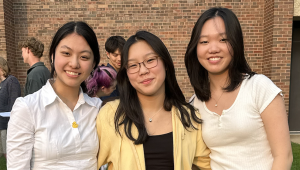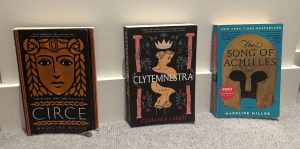New class ‘lights the fire’ for change
Social justice class will teach students to discuss challenges and advocate for change
December 8, 2017
2017 has been a year filled with a number of controversies played day in and out on the news.
Starting next year, a new class, Civics and Social Justice, will help students explore these issues.
Student Voices in Equity sponsors, Todd Maxman and AnnMarie de Serpa, created this class in hopes of inspiring students to be a part of bigger conversations.
“Civics and Social Justice will fulfill the civics requirement but it’s focused on other ideas current ideas of social justice. It’s really social activism combined with an academic approach to civics”, said Maxman.
To combat the polarization of perspectives, Maxman and de Serpa plan to ensure exposure to all points of view.
According to de Serpa, the idea of the course is to look at multiple perspectives and have students look at policies, court cases, local issues, and national issues. “At the end, they will need to make a decision about how they view it.”
Civics and Social Justice isn’t just Maxman and de Serpa’s creation, but the creation of the entire Student Voices in Equity club.
“For the last four years, we have been working with a really active group of students and our student group Student Voices in Equity,” De Serpa said.
The idea came from a group of very vocal students who thought that there was a lack in the curriculum that looked at social justice issues.”
One of their members, junior Isabel Cox, said, “The members of Voices had input regarding the content of the class, and our sponsors modeled the class to teach and improve the skills that we develop in Student Voices.”
According to senior member Jose Chavez, there was talk about having more students experience what members of the club experience. “When Mr. Maxman and Ms. DeSerpa mentioned possibly having a full on course it, we never let it go”, he said.
Student Voices in Equity helps students engage in difficult conversations and gives them an opportunity to share their voice.
Cox said, “Student Voices in Equity meets once a week and plan outreach events and projects. Sometimes, school administrators will attend our meetings to discuss current decisions regarding equity and get our input.”
But the fate of the class is still undetermined.
Junior Mac Rescorl said, “I don’t know if I would take the class. It sounds like it would be really interesting but it might be hard to debate such controversial topics.”
However, some points of view are more widely shared than others.
“We acknowledge our bias because it’s a course on social justice. We live in a system that we think can be more just,” said Maxman. “We’ll talk about how we can recognize the injustice in the system and address that in a place like New Trier, of privilege.”
There might not be a “right” way to approach the conversation, but there should always be a conversation to address, the sponsors and members of the club believe.
“Social justice is always a hot topic, whether the title is explicitly used or not, so it’s important for people in our community to know how to effectively discuss social justice and its implications,” said Cox.
There are more to these conversations than getting your point across.
“While having the intent to educate or persuade others in a controversial discussion is appropriate, effective discussion can only happen when each participant enters the discussion with the intent to listen and learn something new,” said Cox.
In the midst of all the controversies in our world, Civics and Justice aims to educate students in taking charge of their understanding of the world.
“This class would hopefully stimulate more receptiveness in talking, at least, about these controversial issues because having those conversations is so very important, especially now, when everyone is engaged in the politics and societal patterns of our world,” Chavez said.
Maxman hopes students gain a voice. “We want to set the fire on our students to take things on, to take us on, to take the school on, to take the north shore or Illinois or the country on and say ‘hey, let’s make this a better place.’”











































